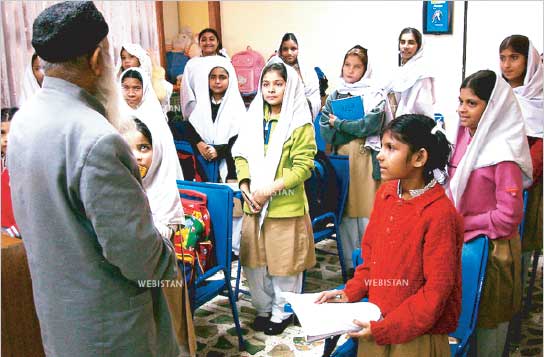 Abdul Sattar Edhi
Abdul Sattar Edhi
and education
“Chasing after desires creates inner turmoil. When the devil becomes guide, dacoits and gangsters are manufactured. He makes men fight against their souls to survive expensive items and most lose everything in the face of his strength. The internal enemy can only be overcome by a personal revolution.”
-Edhi
By Hisham Sajid
The legend is gone, but his legacy lives on. Or does it? “People have become more educated, but have yet to become human,” Edhi was always fond of saying over and over again. His deep love for humanity, regardless of caste colour or creed, is well known throughout the world. However, I feel his comment on our education has a deeper meaning attached to it even if that was not his intention. I believe Edhi sahab was pointing out the root cause of all the moral decay rampant in Pakistan. The lack of compassion we have for our fellow man today is because there is an inert problem with our education system; a system which ‘trains’ us to spend our lives hording wealth.
Accumulation of wealth is by no means a bad practice which should be look down on. However, where globalisation has had many advantages, one of the disadvantages is that we have been led to idolise a certain lifestyle which is built around the accumulation of material wealth; a house in DHA; a new car; a job that pays a high salary and so on.
We’ve been raised to follow a system which focuses on individual growth rather than the society growing collectively; the way we we’ve been educated has only compounded this effect. I believe Edhi’s view on humanity, or lack of it in Pakistan, extends to organisations and corporations too. It refers to the Pakistani socio-economic atmosphere as a whole which, following a very neoliberal model, has created more gaps between the rich and poor, an atmosphere which has made many believe that economic progress equates social regress. Examples of such gaps all around us: Defence Housing Authority (DHA) in Karachi is home to the affluent people. If you go to Phase 1 of DHA, then right next to this housing society, separated by a wall is Mehmoodabad, an area which has a suboptimal standard of living. The difference is much starker in other countries where individualistic ideals have a much stronger hold over the elite; like in Jakarta (Indonesia’s capital), where you’ll find skyscrapers and malls on one side of a road and on the other side there will be slums, areas without proper roads, sewage systems and electricity.
A French philosopher Louis Althusser called education an “ideological state apparatus”. If used correctly, it can be used as powerful tool by states to make ,say, a particular narrative of history or a particular ideology mainstream. It was used by Kamal Attaturk to make Turkey secular; Zia-ul-Haq used it to make Pakistan less secular. Pakistan’s current education system worships success and our definition of success is getting rich. You go to a good school to get into a good college, where you get good grades so that you may enter a prestigious university which will inevitably land you a high paying job, where you spend the rest of your life making large sums of money. A school’s success is measured by the number of admissions its students get into top universities and universities are ranked based on the number of success stories it generates. For example, if you go to IBA Karachi’s Student Center, you see a supposed ‘wall of fame’ where you find framed pictures of successful graduates including Shaukat Aziz, Asad Umar, Mamnoon Hussain and other top level ambitious business executives. I’m not trying to undermine the importance of these people who have earned their place in the corporate world, but I find something inherently wrong with an education system that equates success only with money and power.
There are many reasons Edhi was the man he was; however, I believe the driving power behind his philanthropic spirit was his mother and the ‘education’ she gave him. Edhi received very little formal education. Some sources claim he left school at the age of 13. After migrating to Pakistan in 1947, he started working at the age of 19 as a commission agent selling cloth at the Karachi wholesale market. When he used to go for work, his mother, Ghurba Edhi gave him two paisas for his meal. She instructed him to give one to someone less fortunate than him he may find on the street and keep one for himself. Four years later, he started the Edhi Foundation, and over the next six decades his organisation grew into one of the world’s largest social welfare organisation. Even with millions coming in the form of donations, Edhi chose a simple life, to live in a one-room quarter and never owning more than two set of shalwar kamiz at the same time. He chose a minimalistic lifestyle, denouncing most materialistic pleasures; it made him a better human than most educated people today.